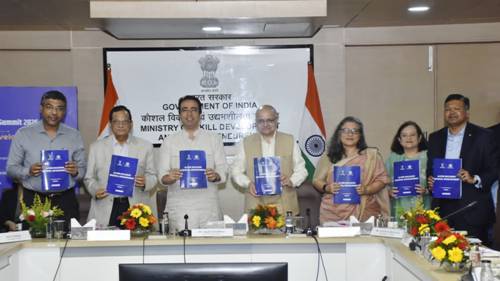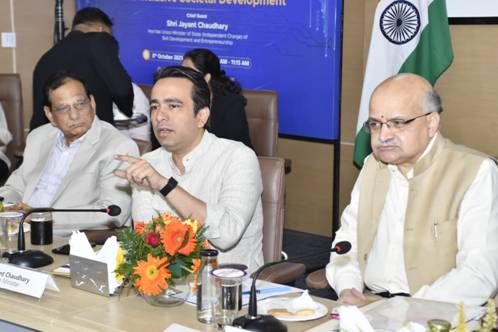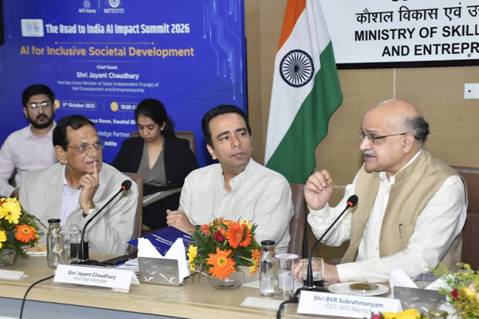Ministry of Skill Development and Entrepreneurship
Shri Jayant Chaudhary Unveils NITI Aayog’s Roadmap on AI for Inclusive Societal Development
Posted On:
08 OCT 2025 6:34PM by PIB Delhi
Shri Jayant Chaudhary, Minister of State (Independent Charge) for Skill Development & Entrepreneurship and Minister of State for Education, Government of India and Vice Chairperson, NITI Aayog, Shri Suman Bery, today launched NITI Aayog’s Frontier Tech Hub study, “AI for Inclusive Societal Development,” developed in partnership with Deloitte.
The launch of report scheme was also attended by distinguished dignitaries including Smt. Debashree Mukherjee, Secretary, Ministry of Skill Development and Entrepreneurship, Ms. Vandana Gurnani, Secretary, Ministry of Labour and Employment, Shri S. Krishnan, Secretary, Ministry of Electronics and Information Technology, the CEO of NITI Aayog, and Ms. Debjani Ghosh, Distinguished Fellow at NITI Aayog and Chief Architect of the NITI Frontier Tech Hub. Their presence highlighted the collaborative approach of the Government in transforming the skill development ecosystem through modernized ITIs, strong industry linkages, and technology-driven skilling initiatives.
The pioneering report is a first-of-its-kind effort to systematically explore how Artificial Intelligence (AI) and frontier technologies can transform the lives and livelihoods of India’s 490 million informal workers — the backbone of the nation’s economy.
While global discourse on AI has largely centred on white-collar jobs and the formal economy, the study shifts focus to the informal sector, which contributes nearly half of India’s GDP yet remains excluded from formal systems of protection, opportunity, and productivity.
Shri Chaudhary noted that the report provides a roadmap for leveraging AI to drive inclusion and productivity in the informal economy, aligning with India’s vision of Viksit Bharat by 2047.
Shri Jayant Chaudhary, said, “Empowering India’s informal workers are not just an economic priority, it is a moral imperative. The goal of Digital Skilling in AI for workers aligns perfectly with our national skilling agenda by leveraging AI and frontier technologies to make learning adaptive, accessible, and demand-driven. By bringing together government, industry, and civil society, this mission will ensure that every worker—whether a farmer, artisan, or healthcare aide—has the skills, tools, and opportunities needed to thrive in the digital economy of tomorrow.”
NITI Aayog’s Frontier Tech Hub emphasizes that AI alone cannot transform the informal sector—technology by itself cannot dismantle deep-rooted systemic barriers. Without deliberate human intent, targeted investments, and an enabling ecosystem, the promise of AI will remain out of reach for those who need it most.
To bridge this gap, NITI Aayog has proposed Mission Digital ShramSetu—a national mission to build the roadmap and ecosystem that make AI accessible, affordable, and impactful for every worker. The mission will leverage AI, blockchain, immersive learning, and other frontier technologies to tackle constraints such as financial insecurity, limited market access, and lack of skilling or social protection—empowering informal workers with digital tools that enhance productivity, opportunity, and dignity in work.
The mission underlines that inclusion demands intent, collaboration, and coordinated action across government, industry, academia, and civil society. Only through such collective effort can AI become a true equalizer—bringing millions at the margins into the mainstream of India’s growth story and advancing the vision of Viksit Bharat 2047.
The roadmap underscored that delays carry a heavy cost: at the current pace, informal workers’ average annual income may stagnate around $6,000 by 2047, far below the $14,500 threshold needed for India to achieve high-income status—making immediate action imperative.
Mr. B.V.R. Subrahmanyam, CEO, NITI Aayog, emphasized the non-negotiable need for collaboration:
“If we are serious about transforming the lives of India’s 490 million informal workers, collaboration is not optional—it is non-negotiable. This goal demands cross-functional action: from focused R&D that reduces the cost of frontier technologies, to building a sustainable ecosystem of innovation tailored to the informal sector, to skilling and reskilling at scale. Only by uniting government, industry, academia, and civil society can we ensure that this mission delivers not just technology adoption, but real, lasting empowerment.”
Ms. Debjani Ghosh, Distinguished Fellow, NITI Aayog and Chief Architect of the Frontier Tech Hub, added, “For India to achieve its $30 trillion Viksit Bharat 2047 aspiration, we cannot leave behind the 490 million workers who power our economy every day. AI will not transform their lives on its own—it requires us to deliberately build the roadmap and ecosystem that make these technologies accessible and affordable. This roadmap is unique because it finally puts their voices, challenges, and aspirations at the center of the AI conversation and lays out a mission mode approach as the pathway to turn this promise into reality.”



Access the Roadmap here:
https://niti.gov.in/sites/default/files/2025- 10/Roadmap_On_AI_for_Inclusive_Societal_Development.pdf
***
SH/IS
(Release ID: 2176445)
Visitor Counter : 1438